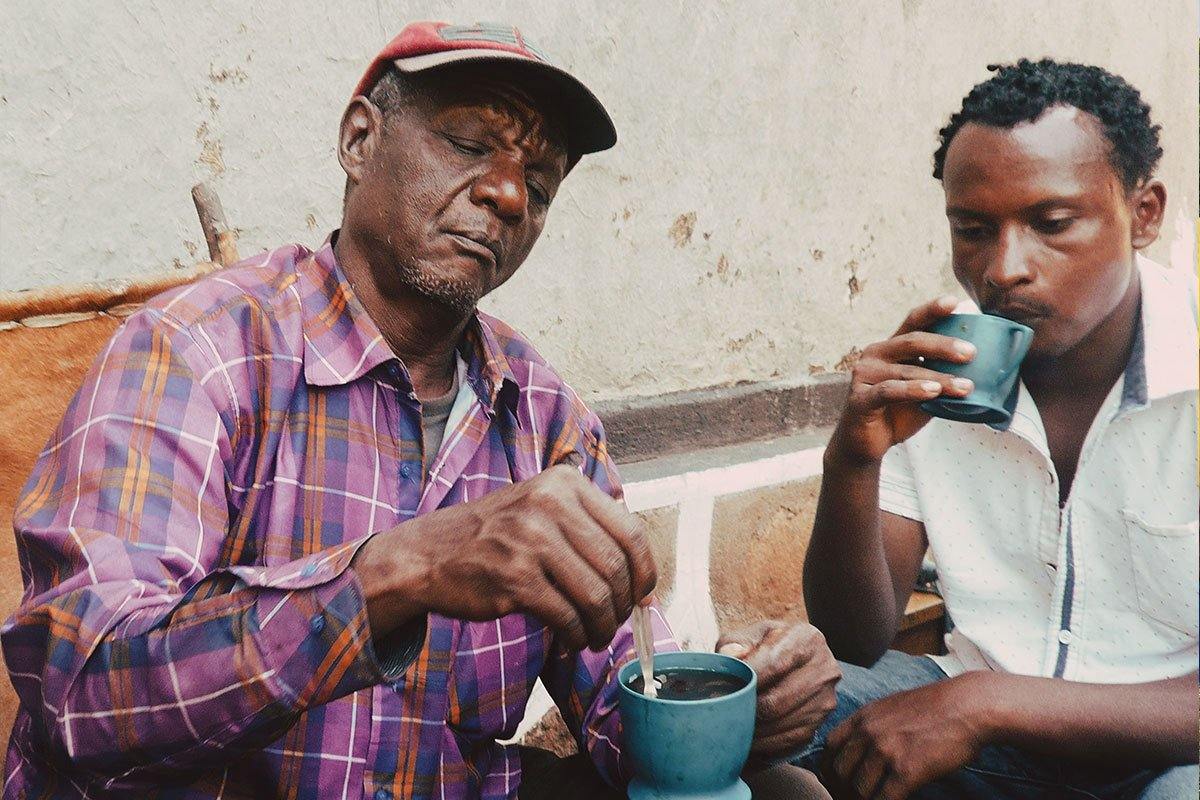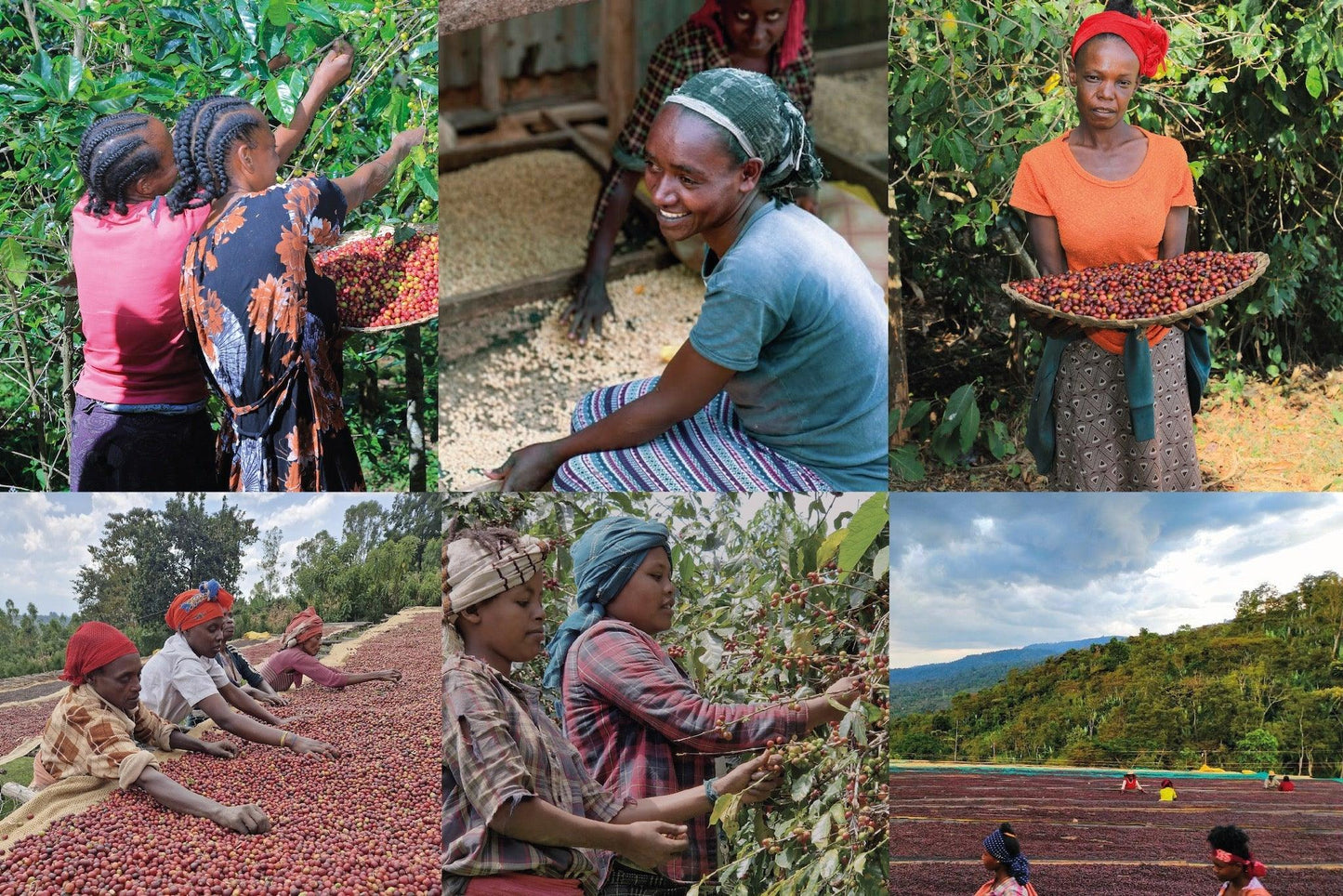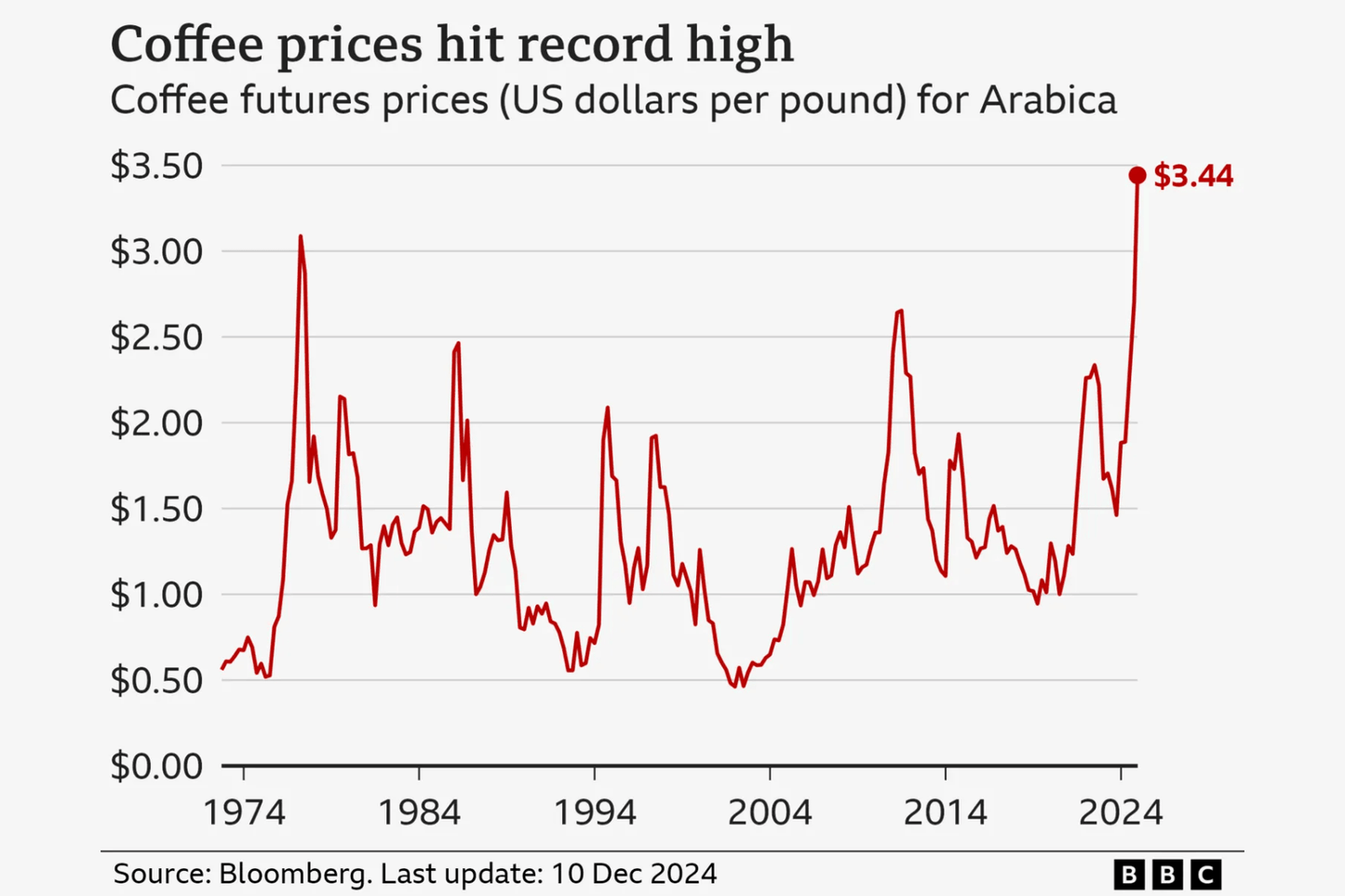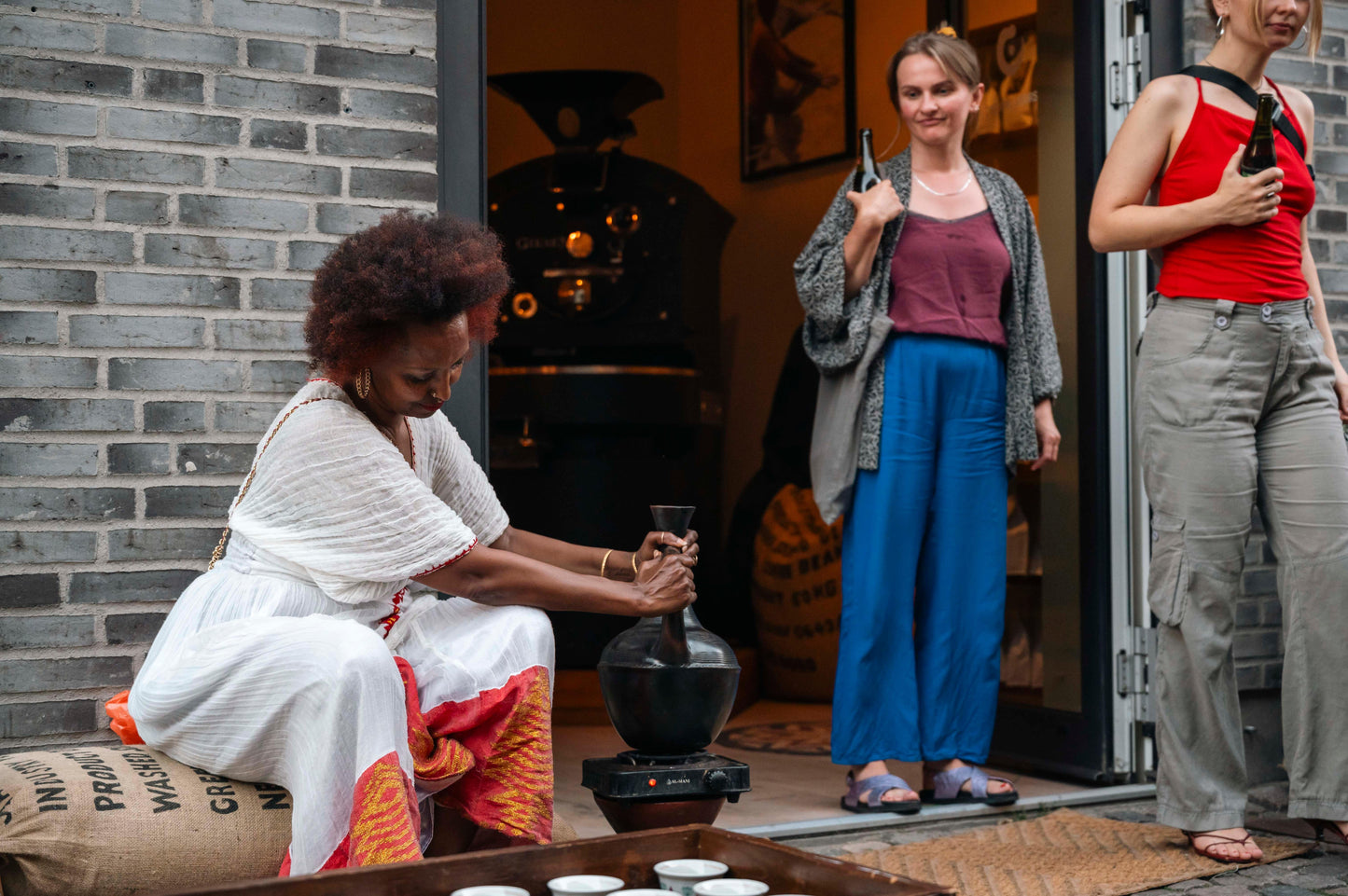You have probably heard that Ethiopian coffees are well-known and prized for many reasons: they have endless varieties, have complex aromas and crisp acidity and are considered among the best coffees in the world.
But these are not the only things that make Ethiopian coffees so unique in our eyes. It’s the history, the genuine passion that a whole country puts into it, that separates Ethiopian coffees from others.
We talked extensively about this in the article, and here is a short summary of the greatness of Ethiopian coffees.
Ethiopian coffees are known for their complex aromas, with many fruity and sometimes winey notes. What’s even more incredible is the difference in taste from one region to another, even from one batch to another.
Because of the country’s varying landscapes, the coffee grown there develops many aromas that make each cup truly unique. Add to that the production methods of Ethiopian coffee, which mostly come from small farmers, and you get so many flavors and aromas of coffee in one single country.
This is also because Ethiopia has amazing growing conditions for coffee, especially high altitude that leads to higher quality coffees. The country’s landscapes vary from one region to another: the numerous varieties of Ethiopian coffee are named after their region of origin. Every Ethiopian coffee has its unique profile. For example, from the rich, flavorful Yirgacheffe to the less acidic Harar.
Add to that the several processing methods used by Ethiopian farmers, depending on the coffee, and it can truly be said that Ethiopia is the land of coffee: everyone can find its favorite among the hundreds and hundreds of varieties found there. From rich, fruity yet acidic flavors to their numerous varieties, the country’s coffee culture is an endless treasure any coffee lover would die to explore.
But having great, high-quality coffee isn’t the only thing differentiating Ethiopian coffees from the rest. After all, many other countries in the world have many varieties of coffees with amazing flavors.
We believe Ethiopian coffee's uniqueness comes from the special place that coffee holds in Ethiopia.
MORE THAN A BUSINESS: THE SPECIAL PLACE OF COFFEE IN ETHIOPIA
In Ethiopia, coffee isn’t simply a business. Sure, many Ethiopians make a living out of it, and the country exports a lot of coffee. However, we mean that coffee has such a huge place that its importance is not restricted to the economic sphere. Coffee is present in every aspect of the country, to the point one could say the whole country seems turned towards it.
A bit of coffee history
Have you heard of the story how coffee was discovered in Ethiopia? The legend goes something like this: a goat herder named Kaldi noticed one day how energetic his goats were. He found that this behavior happened after his animals ate the berries of a certain bush, so he tried them himself. He immediately felt energized and decided to share his discoveries with the monks of a nearby monastery.
But the monks didn’t feel compelled to the berries, and some even believed they were the devil’s work. So they threw the berries in the fire. That’s when the heavenly scent of the roasting berries filled the room, and they decided to try them out. After removing them from the fire, they crushed berries and poured hot water over them.
And that, my friends, is how the first cup of coffee was made according to Ethiopian legends.
The point isn’t how coffee was discovered, but rather when. It is said that Kaldi lived during the 9th century, and that is also when coffee would’ve started to be cultivated in Ethiopia. Although the discovery of coffee brewing may not have been as quick or simple as the monk’s methods, it is believed that coffee was chewed as energy balls before being turned into a beverage in Ethiopia.
Ever since the 16th century, coffee spread around the Islamic world, to soon take over the whole world over the next couple of centuries. Coffee has been present in Ethiopia for centuries and consumed for as long – that goes to show how coffee has been important for the country for so long.

The weight of coffee in Ethiopia’s economy
Coffee is the heart of Ethiopia’s economy: exportation of Arabica accounts for 30% of the country’s revenues, and the industry employed nearly 20% of the population in 2018. In 2015, 525,000 hectares of coffee were cultivated in Ethiopia. In 2017, it is estimated that Ethiopia produced around 470 000 tons of green coffee and the aim of the government is to produce 1.8 million tons by 2024.
The country is also the largest producer in Africa and sixth largest producer of coffee in the world, contributing to 4,2% of the global coffee production. Only half of the produced coffee is exported, meaning the other half is consumed domestically – and this gives a pretty good idea of how important and loved coffee is by Ethiopians.
The majority of the Ethiopian coffee farmers are small. Meaning that the most dominant coffee production systems are garden coffee, forest and semi-forest coffees. Garden coffee is exactly as the name says, coffee cultivated in people’s gardens. Forest and semi-forest plantations mean the coffee is cultivated in the shade of the trees. Large plantations that are over 500 hectares are rare, and only contribute to a little less than 5% of the exported production.
This shows how coffee holds an essential place in the country’s agriculture, and in its economy in general. Coffee growing provides an income for a fifth of the population and is so common and widespread that most of it is done in small farms or in gardens.
Coffee in the Ethiopian culture and society
Aside from the very well-known Ethiopian coffee ceremony everyone seems to know of – and about which we wrote an article here, language is another way to witness the role coffee plays in Ethiopians’ daily life.
For instance, the common Ethiopian saying “Buna dabo naw” translates to “coffee is our bread”: this shows that coffee, much like bread, is a commonly consumed good in the country. Another example is the saying “Buna Tetu”. Though it literally means “drinking coffee,” it refers to the social interaction woven in the act of coffee time in Ethiopia as socialization time, where everyone gathers and talks about their lives and other matters.
Coffee may be a national drink, but it is way more than that: it plays a huge role in the Ethiopian society. Not only does it contribute to its cohesion and acts like a link between people, but it is also the bearer of centuries of traditions. That is why the coffee ritual is still honored and performed, though it requires 45 minutes that most of us wouldn’t spare. It’s not about the coffee: it’s about welcoming a guest, sharing a culture, and taking the time to connect with others.
It’s about how coffee growing is in the hands of the people, who consider it an honor when they inherit coffee farms. How their centuries-long knowledge is used to produce the best, high-quality coffee beans. How by following ancient traditions, they elevated coffee growing into a form of art, a mastery that’s unique to the country.
It’s about the intricate and intimate relationship Ethiopians have with coffee, how ingrained it is in their daily lives, something not found anywhere else. An entire people’s culture, traditions and passion poured into the coffee they grow for us to enjoy.
All this, that’s what makes Ethiopian coffees unique. We wouldn’t dare to say this article encompasses everything coffee represents to these people; but hopefully, we have conveyed to you a little of our shared passion.





